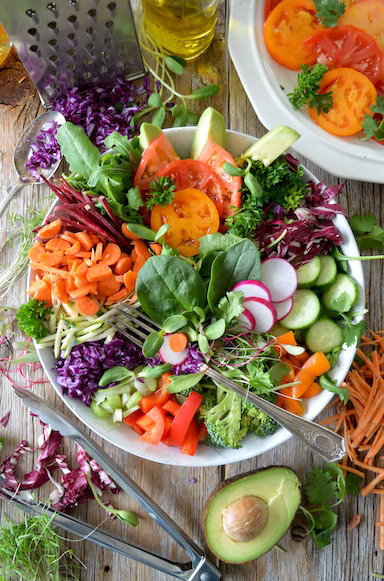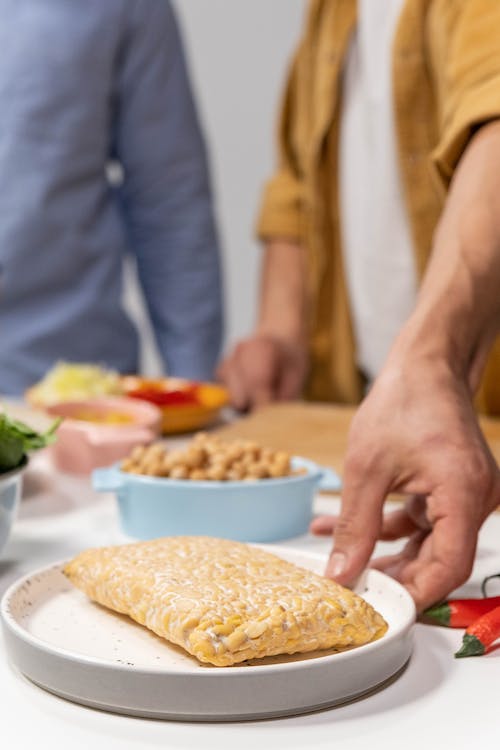Diet Recommendations
by: Dr. Shivani Gupta
TED: the diet low down
You have been diagnosed with TED, and most likely also an underlying autoimmune thyroid condition known as Graves’ disease. You are doing all the right things – seeing qualified specialists and have come up with a plan of care that you feel comfortable with. Yet you still feel helpless. That’s because your body is waging a war on itself, and it can feel like you are on the sidelines watching it happen but unable to do anything. A lot of people with TED feel like they have no control. But there are things you can do to help – and adjusting your diet is one of them.
After having treated thyroid eye disease patients for 10 years, I have had countless patients ask about how they can make changes in their diet. Here are some of my recommendations on ways to change your diet to help reduce inflammation in your body:
Eat whole, plant– based foods. To many, a plant-based diet might seem like too much to commit to, but my recommendation is that you make small changes at first. Start incorporating more fresh fruits and vegetables into your diet, and then continue to expand as you feel comfortable and creative with recipes.

Consider reducing lectins in your diet – lectins are proteins that bind to carbohydrates and may cause inflammation within the body. They are often found in grains, beans, legumes, and in higher concentration in the skins and seeds of certain vegetables. Some people advocate that patients with autoimmune diseases should eliminate lectins from their diets, but this would likely result in cutting out foods that have a lot of other nutrients that are beneficial. So, my suggestion is to try to reduce lectins in your diet by doing the following:
- Always eat pressure cooked beans and legumes
- Eat sprouted tofu and other sprouts – this not only reduces lectins but unlocks other nutrients
- Consider removing skins and seeds in vegetables such as peppers, eggplants, cucumbers & tomatoes
- Eat fermented soy products such as tempeh & miso

Avoid refined carbohydrates – this includes, sugar, candy, and products made with processed flour. Refined carbs can wreak havoc on our bodies, and that includes inflammation. Think about switching to natural sweeteners such as agave or date syrup. Also consider switching to flour alternatives such as almond or oat flour, and grain free products such as tortillas made with coconut flour or cassava flour (can be purchased in grocery stores).

Avoid animal protein – animal protein can induce inflammation within the body, and chronic animal protein intake can lead to – you guessed it, chronic inflammation. While the relationship with animal protein to TED has not been studied, it has been linked to many chronic diseases with inflammation the underlying mechanism. So, my advice is always to minimize animal protein when possible.

Avoid processed foods – it might be easier to reach for a prepackaged meal at the end of a long and busy day, but it won’t be doing you much good. Processed foods alter the bacteria in our gut (more on that below), which can then lead to chronic inflammation. Your best bet is to avoid processed foods as much as possible!

Cook at home – the best way of being in control of what you put into your food and therefore your body is to cook food at home.

Consider intermittent fasting – intermittent fasting has been shown to reduce inflammation within the body. My suggestion is to start off with small intervals to start (say 10-12 hours), then increase the interval as you are able to. Remember, always listen to your body first and foremost!

Be kind to your gut – we are still in the early phases of learning about how our gut interacts with the rest of our body – but one thing is clear and that is that what you eat affects the composition of microbes in your gut (your gut microbiome), which can affect inflammation in your body. So, feed your gut things that support a healthy microbiome including pre and probiotic foods.
- Prebiotic foods – help support healthy microbes. Include vegetables such as garlic, onion, asparagus, leeks, sunchokes, bananas, apples, mushrooms and watermelon.
- Probiotic foods – introduces friendly gut bacteria. This includes fermented foods such as sauerkraut, pickles, miso, sourdough bread, tempeh & kimchi

